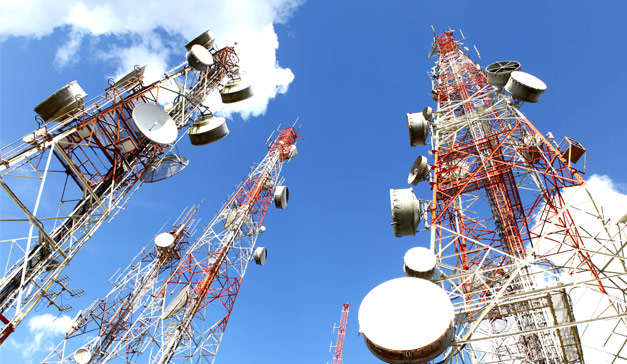Telecom
Nigeria’s Telecoms Sector Threatened by Economic Challenges – Ikemesit Effiong

Ikemesit Effiong, Chairman of the Technology Committee of the Nigerian Bar Association Section on Business Law, has raised concerns about the sustainability of Nigeria’s telecoms sector amid ongoing economic challenges.

In an insightful article titled “The Imperative of Upholding Nigeria’s Telecoms Lifeline,” Ikemesit delves into the sector, emphasizing its pivotal role as both an economic engine and societal enabler. With approximately 15,000 direct employees and a significant 16% contribution to Nigeria’s GDP, the sector’s health is crucial for the nation’s well-being.
Ikemesit highlights various obstacles facing the telecoms industry, including frequent fibre optic cable cuts due to road construction and vandalism, multiple taxations, and challenges in acquiring rights-of-way. These issues, compounded by exploitative rent-seeking practices, have persisted despite efforts to resolve them.
“Central to the sustenance of any industry is a conducive economic environment that allows for sustainable growth and innovation,” writes Ikemesit. However, regulatory constraints that limit tariff adjustments hinder the sector’s ability to adapt to market dynamics unlike other industries.
Recent data from the National Bureau of Statistics (NBS) indicates a rise in inflation to 33.20% in March 2024, up from 31.7% in February 2024. This poses significant challenges for businesses striving to manage staff welfare and make necessary investments amid economic strains.
The inflationary pressures have led to price increases across various sectors, including agriculture, beverages, and services. Companies such as Nigerian Breweries Plc and Netflix have adjusted prices multiple times this year to cope with rising costs.
Recently, the quality of service has become a significant concern for subscribers across the country. Available data indicate that this issue may persist for the foreseeable future. The 70% broadband penetration target set by Bosun Tijani, Nigeria’s Minister of Communication, Innovation, and Digital Economy, was severely impacted in 2023, experiencing a decline of 14.2% from a peak of 48.28% in March to 41.87% in November.
With operators reporting financial losses in 2023 and a challenging outlook for 2024, it is evident that funding will pose a significant challenge for the necessary investments needed to transform the sector.
Describing the challenges of the sector in 2023, Engr. Gbenga Adebayo, Chairman of the Association of Licensed Telecommunications Operators of Nigeria (ALTON), said, “ALTON’s members currently pay at least 49 different taxes and levies. Additionally, our members continue to bear the brunt of multiple taxation and coerced compliance with tax and levy demands that have no legal basis by sub-nationals. This threatens investment, sustainability, and industry growth.
“Instances include – exorbitant Right of Way fees, increases under the Finance Act 2023 (such as an upward review of Tertiary Education Trust Fund Tax from 2.5% to 3%, imposition of Value Added Tax on cell towers (Base Stations), imposition of import levy on goods, removal of capital allowance on telecommunications goods and services under Section 32 of the amended Companies Income Tax Act), amongst others.”
In the past 10 years, telcos have maintained the same charges for calls and data, despite inflation rising from 8.05% in 2014 to 33.20% in 2024, and the dollar increasing from 185 naira in 2014 to about 1,000 naira in 2024.
Considering that this sector supports Nigeria’s 221.7 million active voice subscriptions and 160.2 million data subscriptions, with immense consequential economic and social value, leaving it to resolve its challenges independently or risk collapse poses significant threats to Nigeria’s socio-economic stability. Stakeholders in the sector are urging the government to either invest in the sector as needed or adopt a cost-reflective tariff to facilitate necessary investments.
Telecom
MTN Nigeria Crowns Ayo Benzi Winner of Next Afrobeats Star

MTN Nigeria, in collaboration with ONErpm and Ultima Studios, has announced Ayodeji Benson, popularly known as Ayo Benzi, as the winner of the maiden edition of the Next Afrobeats Star reality show.

L-R: Onyinye Ikenna-Emeka, Chief Marketing Officer, MTN Nigeria; Ayodeji Benson, Winner, Next Afrobeats Star Reality Show (Season 1) and Emamoke Ogoro, General Manager, Brand and Communication, MTN Nigeria, at the grand finale of the Next Afrobeats Star Reality Show (Season 1), held at the Ultima Studios, Lekki, Lagos on Saturday, December 13, 2025.
The grand finale, held on Sunday night at Ultima Studios in Lekki, Lagos, marked the climax of a nationwide talent search that began in September with over 15,000 aspiring musicians.
After weeks of auditions, mentorship, and rigorous training, five finalists – Ayo Benzi, Dave Cash, Kaeko, Somto O’Laker, and Lucky Yay – battled for the top prize in a high-energy showcase of performance and artistry.
At the end of the electrifying contest, Ayo Benzi emerged victorious, securing a ₦150 million music deal. Dave Cash was named first runner-up with ₦100 million, while Kaeko, Somto O’Laker, and Lucky Yay received ₦75 million, ₦50 million, and ₦25 million respectively.
Throughout the season, contestants were mentored by leading Afrobeats producers Sarz, Puffy Tee, P Prime, and Andre Vibez. Benzi, who was part of Puffy Tee’s team, credited the mentorship programme for sharpening his craft and stage presence.
Speaking at the event, Onyinye Ikenna-Emeka, Chief Marketing Officer of MTN Nigeria, said the initiative reflects the company’s commitment to youth empowerment and cultural expression.
“The Next Afrobeats Star platform is about creating real opportunities for young Nigerians and giving their talent the structure, visibility, and support it deserves.
“Afrobeats continues to place Nigeria on the global cultural map, and MTN is proud to be enabling the next generation of artists who will take this sound even further,” she said.
She added that the finale was not just a competition but a celebration of growth and readiness for the global stage.
In his acceptance speech, Ayo Benzi described the victory as a defining moment in his career.
“A big thank you to MTN. From the audition days, the treatment MTN has given us has been amazing. God bless the brand,” he said.
The finale also featured guest performances by Afrobeats stars Iyanya and Bella Shmurda, adding glamour to the night and reinforcing the show’s connection to the wider music ecosystem.
With the successful conclusion of the season, MTN Nigeria and its partners reaffirmed their role in championing youth ambition, supporting creative industries, and shaping the future of Nigerian music through platforms that turn potential into opportunity.
Telecom
T2 Faces NCC Probe in Benue Over Major Service Outage in 9 LGAs

T2, formerly known as 9mobile, is under investigation by the Nigerian Communications Commission (NCC) in Benue State for an undisclosed incident disrupting USSD, SMS, voice, and data services across nine local government areas.

T2
The affected areas include Ado, Agatu, Gwer East, Gwer West, Konshisha, Obi, Ohimini, Okpokwu, and Otukpo, as detailed in an advisory on the NCC Major Outages Portal, which tracks significant disruptions reported by Mobile Network Operators (MNOs) and Internet Service Providers (ISPs).
Neither T2 nor its public relations firm, Chain Reactions, has responded to inquiries on the outage’s cause or restoration efforts as of this report.
The NCC’s continued reference to the operator as 9mobile, months after its public rebranding to T2 in August 2025, has sparked questions about whether the name change was formally notified to the regulator.
This probe aligns with NCC mandates requiring operators to disclose major outages, their impacts, and timelines for fixes, with compensation obligatory for disruptions exceeding 24 hours under the Consumer Code of Practice Regulations.
Industry watchers note that such incidents, often linked to fibre cuts, power failures, or infrastructure faults, underscore ongoing challenges in Nigeria’s telecoms sector, particularly amid T2’s subscriber losses post-rebrand. NCC vows transparency via its portal to hold operators accountable and protect consumers.
Telecom
NCC Unveils Draft 5-Year Spectrum Roadmap, 60 GHz License-Exempt Guidelines to Boost Broadband, Innovation

Nigerian Communications Commission (NCC) has unveiled two pivotal regulatory draft documents aimed at reshaping Nigeria’s communications sector over the next five years and fast-tracking deployment of ultra-high-speed wireless technologies.

NCC
In a public notice dated December 19, 2025, and issued pursuant to its mandate under the Nigerian Communications Act (NCA) 2003, the Commission published the Draft 5-Year Spectrum Roadmap for the Communications Sector (2025–2030) and Draft Guidelines for the Use of the 60 GHz License-Exempt Band for Multi-Gigabit Wireless Systems.
Both documents are accessible on the NCC website for stakeholder review, with the roadmap outlining strategic spectrum planning, allocation, and management to optimise utilisation, support emerging technologies like 5G and IoT, expand broadband access, and align with global best practices.
The Spectrum Roadmap emphasises four core pillars: bridging the digital divide through low-band spectrum and satellite services, attracting investments via flexible licensing models, enhancing service quality with mid-band optimisation, and fostering innovation in areas such as direct-to-device connectivity and secondary spectrum trading.
It sets ambitious targets including universal 4G coverage nationwide, 50 per cent 5G penetration in state capitals, and average broadband speeds of 100 Mbps by 2030, while addressing rising data demand through band refarming and efficient management.
Complementing this, the 60 GHz Guidelines establish a license-exempt framework for the 57–66 GHz band, enabling multi-gigabit speeds up to 10 Gbps for short-range applications like WiGig, fixed wireless access, enterprise connectivity, urban broadband, and backhaul solutions.
The rules mandate NCC type approval for equipment, site registration for outdoor use, and interference mitigation measures, while prohibiting wide-area networks to safeguard primary users.
In line with Section 58 of the NCA 2003, NCC invites comments from industry operators, equipment manufacturers, consumer groups, and the public, with submissions due by Friday, January 16, 2025, via email to [email protected], [email protected], and [email protected].
The notice, signed by Mrs Nnenna Ukoha, Head of Public Affairs, stresses that stakeholder inputs will refine the frameworks to drive innovation, investment, competition, and sustainable growth in Nigeria’s telecoms ecosystem.

 Telecom3 days ago
Telecom3 days agoGoogle Finally Allows Users to Change Gmail Address, Keeps Data and Services Intact

 News3 days ago
News3 days agoInsomniaQ Spotlights African Creativity in Lagos

 General News3 days ago
General News3 days agoT2 Backs Youth Excellence as NCBC Wins Bosun Tijani Foundation Basketball Tournament

 E-Financial2 days ago
E-Financial2 days agoNigeria’s N58.18trn Budget and Rising Cost of Deficit Governance

 Telecom2 days ago
Telecom2 days agoNnaemeka Ani – The Architect of ‘Code and Courage’

 Telecom2 days ago
Telecom2 days agoMTN Nigeria Appreciates Partners, Customers at Lagos Prestige Experience

 Telecom21 hours ago
Telecom21 hours agoT2 Faces NCC Probe in Benue Over Major Service Outage in 9 LGAs

 Telecom21 hours ago
Telecom21 hours agoNCC Grants 45 Days for Telecoms Firms to Fix Unapproved Shareholding Changes


























